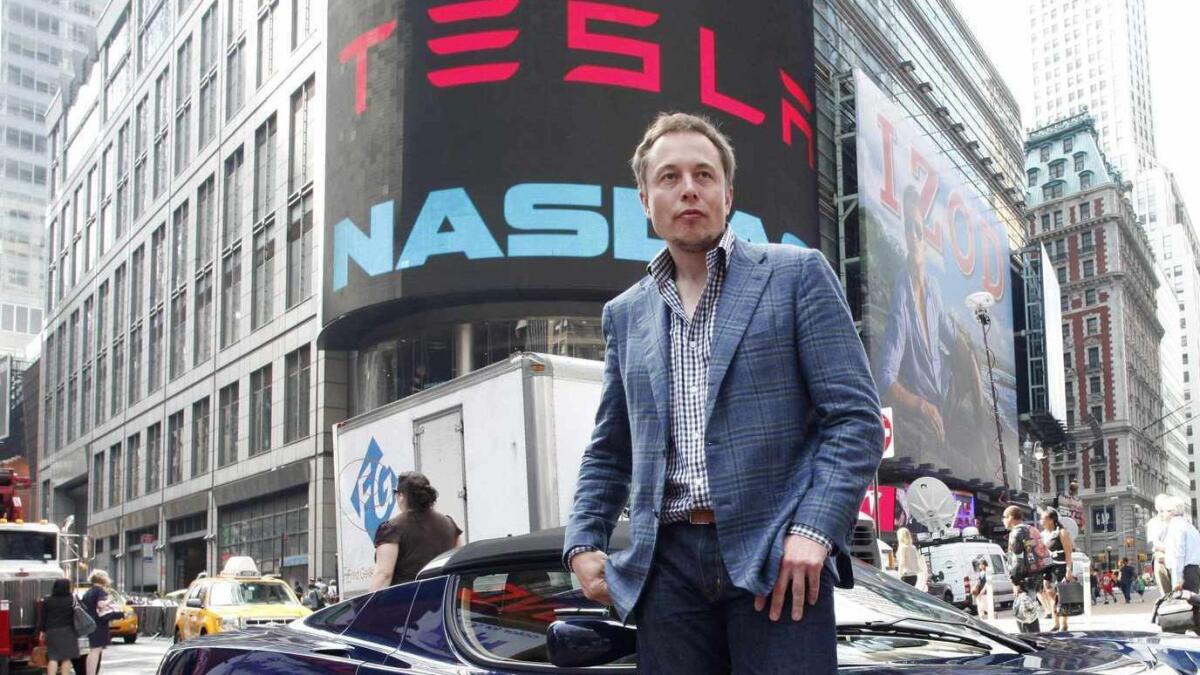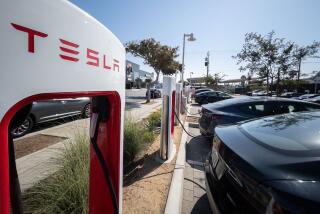Musk: Is he P.T. Barnum or Albert Einstein? Two views on the plan to take Tesla private

When Elon Musk tweeted Tuesday that he was considering taking Tesla private, and claimed that funding had been secured, he only inflamed the debate over whether the electric car company is about to drive itself off a cliff or propel itself toward financial glory.
The Times talked to two financial professionals with different opinions on Musk’s motivations and diametric views on the prospects for Tesla as a private company.
Michael Jacobs, Jacobs Capital
Michael Jacobs is pretty sure he knows why Elon Musk wants to take Tesla private.
“What’s driving him nuts are the short sellers,” said Jacobs, who runs Jacobs Capital, a mergers and acquisitions advisor in Chapel Hill, N.C. “There are a lot of people who benefit from badmouthing his company. He doesn’t want his image tarnished.”
Also a professor of finance at the University of North Carolina’s business school, Jacobs dismissed the idea that private investors would put more pressure on Musk and cause him more distress than Wall Street and short sellers already are doing.
Any major participant in a Tesla buyout will have already bought into Musk’s vision for the company, he said.
“A big investor who wanted to weigh in on some strategic issue is very different from a short seller talking trash about his business,” he said. “At least he’d have everyone rowing in the same direction.”
Jacobs noted he has no idea how such a deal would be structured — like most everyone outside Musk’s innermost circle. But it’s unlikely to resemble a typical leveraged buyout dominated by private equity investors who depend on debt financing. More likely: a few big investors who already have the cash.
Tesla talked with Japanese tech investor SoftBank Group Corp. last year about a private buyout, Bloomberg reported. And on the same day Musk was tweeting about a possible deal, the Financial Times reported that Saudi Arabia’s sovereign wealth fund had invested up to $2 billion in a Tesla stake.
Given a strong economy and so-far unrelenting stock gains, more individuals and family investors are joining private equity groups as major funders of private buyouts.
And unlike equity firms that often must cash out their funds after about 10 years, “more and more families and individuals are investing with absolutely no time horizons. They don’t have to get out of an investment to please limited partners” in a hedge fund. Sovereign wealth funds in the Middle East and elsewhere can be just as patient or more.
Still, a huge buyout between $70 billion and $80 billion will require a “herculean effort” to pull off, Jacobs acknowledged. For private investors, he said, “cash flow is the driving force,” and Tesla’s free cash flow is persistently negative.
“But if anyone can do it, Elon Musk can do it,” Jacobs said. “He’s a legend and a genius. He’s the smartest guy since Einstein.”
(For what it’s worth, Jacobs drives a Tesla Model S and loves it.)
John McClain, Diamond Hill Capital Management
Like much of Wall Street, John McClain questions how real Musk’s buyout plan is.
“You could make a valid argument that this company shouldn’t be part of the public market,” said McClain, the portfolio manager at Diamond Hill Capital Management in Columbus, Ohio.
Tesla has been in business for 15 years, it’s bleeding cash and it hasn’t posted an annual profit since it went public in 2010, he noted. In other words, it’s a long-term bet. But executing a buyout on this scale — potentially up to $60 billion — is daunting.
“The valuation is so rich, it’s hard to make the argument to step in with that kind of capital,” McClain said. “The sheer magnitude of putting that many chips in one basket doesn’t seem likely.”
While every chief executive desires a higher stock price, McClain sees several incentives for Musk and Tesla to goose its shares higher.
The principal on $920 million in convertible bonds comes due next March. The bonds are convertible to equity shares if the stock price trades at $359.87 or above. (Tesla stock closed at $370.34 on Wednesday. It was trading at about $345 when Musk issued his tweet Tuesday saying funding was “secured” for a private buyout.)
If the debt converts to equity, Tesla no longer needs to pay off the bonds and saves itself from a $920-million cash outlay.
To McClain, that constitutes a “stealth equity raise.”
Furthermore, Musk’s compensation is tightly tied to massive increases in the market value of Tesla stock, although he must also hit certain earnings targets, too. “His pay package is unlike anything we’ve ever seen before,” McClain said.
For each $50-billion hike in Tesla’s stock value, Musk receives a 1% share of company stock. That’s worth $1 billion if the company hits a $100-billion market value (in addition to the gain in the 20% of Tesla stock he already owns). If the company’s market value ever reached $650 billion, Musk would have gained a total of $55 billion from the new stock grants alone.
Another incentive: According to government filings, Musk has personally borrowed at least half a billion dollars, and possibly more, using Tesla shares as collateral. If the stock falls below a level set under the lending terms, Musk would have to pledge more shares to meet collateral obligations under what’s known as a margin call.
There’s also an emotional component to the plan Musk laid out Tuesday, McClain said: He wants to stick it to short sellers, who own more than a quarter of Tesla stock and who can only lose more money as Tesla’s stock price rises.
(McClain said Diamond Capital doesn’t allow him to reveal whether it holds Tesla positions, short or long.)
Twitter: @russ1mitchell







